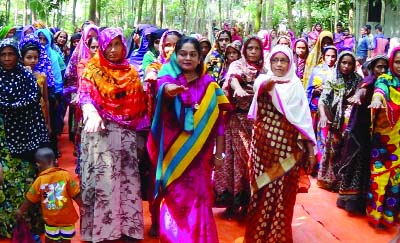
BSS, Rajshahi :
Speakers at a discussion here unequivocally mentioned emphasis should be given on formulating integrated groundwater use policy for Barind area for the sake of ensuring good governance relating to water.
They viewed there is a need of formulating water policy based on recommendations and opinions of the people concerned so that they can derive total benefits in this field.
They were addressing a daylong workshop titled “Policy Discussion for Groundwater: Barind Area, NW Bangladesh” held in the conference hall of Barind Multipurpose Development Authority (BMDA) in the city on Thursday.
Dhaka University (DU), Rajshahi University and University College, London (UCL) jointly organized the workshop discussing ways and means of how to use the groundwater judiciously through formulating effective and integrated groundwater use policy.
BMDA Chairman Dr Akram Hossain Chowdhury and its Executive Director Engineer Abdur Rashid addressed the meeting as chief and special guests respectively with Pro-VC of RU Prof Chowdhury Sarwar Jahan in the chair.
Prof Kazi Matin Ahmed and Prof Kamrul Hassan from Dhaka University, Prof William G Burges from UCL, Country Representative of Swiss Red Cross Amitabh Sharma, Executive Director of DASCOH Akramul Haque and BMDA Superintending Engineers Dr Abul Kashem and Shamsul Huda spoke as resource persons.
Dr Akram Chowdhury said the climate change has been acknowledged as the depletion of natural resources and as a major threat to the humanity and urged the policy planners and others concerned to take immediate effective measures to address the adverse impact.
He further said the dried area has been seeing drought conditions with gradual increase of extreme weather conditions, sharp declining in groundwater table and decreasing rate of rainfall.
He put emphasis on groundwater recharging by enriching the surface water resources through necessary excavation and re-excavation of the derelict ponds and canals and treatment of the water on an emergency basis.
In his remarks, Prof Chowdhury Sarwar Jahan said adverse impact of climate change has been posing a serious threat to the agriculture and overall public health especially relating to water and sanitation in the vast Barind tract.
To face the natural catastrophe, substantial and sustainable promotion of agricultural and water and sanitation related modern technologies have become an urgent need as the vulnerable water and sanitation situation is closely associated with the climate change, he added.
Prof Chowdhury emphasized the need for finding out effective strategies to cope with the existing and new challenges regarding water and sanitation in drought situation in the region particularly Rajshahi and Chapainawabganj districts.
Speakers at a discussion here unequivocally mentioned emphasis should be given on formulating integrated groundwater use policy for Barind area for the sake of ensuring good governance relating to water.
They viewed there is a need of formulating water policy based on recommendations and opinions of the people concerned so that they can derive total benefits in this field.
They were addressing a daylong workshop titled “Policy Discussion for Groundwater: Barind Area, NW Bangladesh” held in the conference hall of Barind Multipurpose Development Authority (BMDA) in the city on Thursday.
Dhaka University (DU), Rajshahi University and University College, London (UCL) jointly organized the workshop discussing ways and means of how to use the groundwater judiciously through formulating effective and integrated groundwater use policy.
BMDA Chairman Dr Akram Hossain Chowdhury and its Executive Director Engineer Abdur Rashid addressed the meeting as chief and special guests respectively with Pro-VC of RU Prof Chowdhury Sarwar Jahan in the chair.
Prof Kazi Matin Ahmed and Prof Kamrul Hassan from Dhaka University, Prof William G Burges from UCL, Country Representative of Swiss Red Cross Amitabh Sharma, Executive Director of DASCOH Akramul Haque and BMDA Superintending Engineers Dr Abul Kashem and Shamsul Huda spoke as resource persons.
Dr Akram Chowdhury said the climate change has been acknowledged as the depletion of natural resources and as a major threat to the humanity and urged the policy planners and others concerned to take immediate effective measures to address the adverse impact.
He further said the dried area has been seeing drought conditions with gradual increase of extreme weather conditions, sharp declining in groundwater table and decreasing rate of rainfall.
He put emphasis on groundwater recharging by enriching the surface water resources through necessary excavation and re-excavation of the derelict ponds and canals and treatment of the water on an emergency basis.
In his remarks, Prof Chowdhury Sarwar Jahan said adverse impact of climate change has been posing a serious threat to the agriculture and overall public health especially relating to water and sanitation in the vast Barind tract.
To face the natural catastrophe, substantial and sustainable promotion of agricultural and water and sanitation related modern technologies have become an urgent need as the vulnerable water and sanitation situation is closely associated with the climate change, he added.
Prof Chowdhury emphasized the need for finding out effective strategies to cope with the existing and new challenges regarding water and sanitation in drought situation in the region particularly Rajshahi and Chapainawabganj districts.

